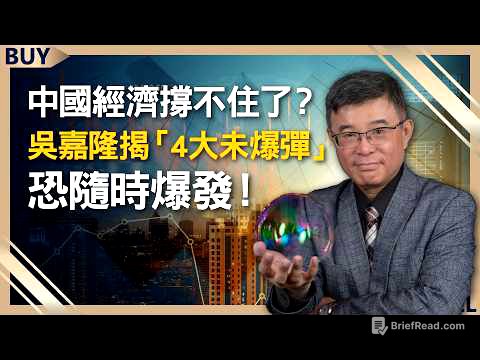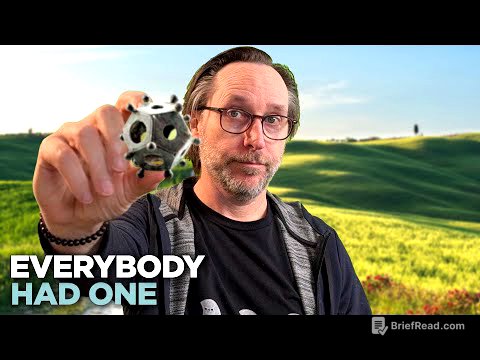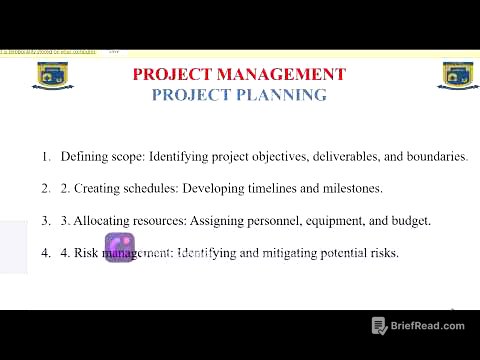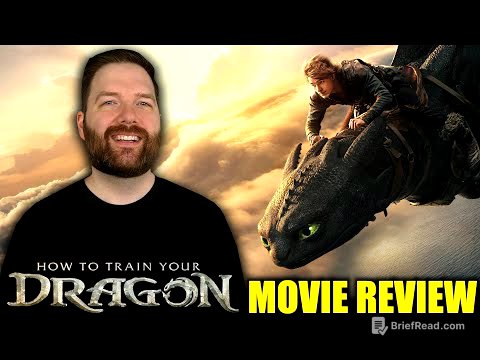TLDR;
This video addresses the growing concerns about AI's impact on jobs and the economy. It emphasizes the importance of continuous learning and becoming a creator rather than just a consumer in the age of AI. The discussion highlights the potential risks of complacency and the need to proactively develop skills that are difficult to automate or replace.
- Clarity comes from doing the work, not just thinking about it.
- The world is dividing into consumers and creators, with AI favoring the latter.
- Continuous learning and skill development are crucial for staying relevant in the job market.
- Those who can leverage AI to do things others can't will thrive.
AI and the Future of Jobs [0:02]
The initial question revolves around how to learn and optimize AI for generating side income, particularly in fields like animation. The speaker breaks down the question, emphasizing that clarity comes from doing the work rather than just thinking about it. He cautions against paralysis by analysis, where overthinking the benefits and disadvantages leads to inaction.
The Trap of Consumption [1:26]
The discussion shifts to the dangers of becoming solely a consumer of content, products, and services. The speaker stresses the importance of being a creator who builds something of value for the world. Focusing solely on earning money can make individuals vulnerable to scams and short-term trading losses. He urges the audience to become constant learners and grow their skills to avoid becoming obsolete.
The Illusion of Security [5:34]
The speaker warns against the false sense of security that comes with a stable job and salary. He describes salary as a drug that can lead to complacency and a focus on managing expenses rather than growing skills. The AI world is dividing into consumers and creators, with AI systems increasingly controlling consumers' lives through personalized content and ads.
The Two Paths: Consumer vs. Creator [7:55]
The speaker predicts that the vast majority of people will remain consumers, increasingly controlled by AI-based systems. He contrasts this with the mindset of being young at heart, which means constantly updating oneself, being full of energy, and being ready to learn anything. This involves being a creator, being curious, and constantly implementing ideas in real-life scenarios.
Proactive Skill Development [9:28]
The speaker uses an analogy of going to the hospital instead of the gym when seriously ill to illustrate the importance of proactive skill development. He argues that when things are going well, it's the time to strengthen oneself by learning and growing. Consuming content like porn can dull the mind and lead to a loss of control. He connects fun with addiction and consumerism, urging the audience to avoid these traps.
The Shifting Landscape of Jobs [12:11]
The speaker presents two choices: clinging to the illusion of job security or recognizing the need for constant learning and adaptation. He warns that a major global crisis could disrupt the financial system and wipe out savings. He advises those who are currently free and well-settled to consider themselves lucky and work on themselves as fast as possible.
Learning How to Learn [18:01]
The speaker emphasizes the importance of learning how to learn and using AI to create content for kids as an example. He notes that while there's no guarantee of earning money, it guarantees learning new skills that can be useful in various contexts. He criticizes the focus on placement guarantees in education, arguing that the world has changed and there's a generation gap between those who understand this and those who don't.
Automating the Future [19:36]
The speaker shares his personal experience of using AI to automate various aspects of his life and business, significantly reducing the time required for tasks. He encourages the audience to use AI to generate leads in their respective fields, such as real estate, and to understand how these processes can be automated.
The Value of Irreplaceability [21:52]
The speaker warns that even if one possesses a valuable skill, their job is not safe if someone else can be easily taught to do it. He explains that older employees with higher salaries are more likely to be replaced by younger, more aggressive individuals who are willing to work for less. He urges the audience to upgrade themselves and avoid becoming a liability in the AI world.
The Harsh Realities and Sentiments [22:54]
The speaker suggests using one's brain to understand the implications of AI and the direction in which the world is heading. He notes that the media often presents a positive picture, but many people are struggling. He highlights the importance of consumer sentiments in predicting economic trends and the value of information, especially when it comes from an experienced and unbiased source.
Preparing for the Inevitable [24:37]
The speaker warns that something very big is about to happen and urges the audience to get ready today. He uses the analogy of horses being replaced by cars to illustrate how once-valuable skills can become obsolete. He describes how AI systems are becoming more intelligent than humans, making many white-collar jobs redundant.
The Rise of AI Agents [25:22]
The speaker predicts the emergence of AI agents that can replace human employees in various departments, such as sales and customer support. He explains how companies will be incentivized to remove human employees and replace them with AI agents that can deliver better results at a lower cost.
The Mindset for the New World [26:35]
The speaker emphasizes the importance of having a mindset that one can learn anything and do anything alone, without money. He warns that those who lack this mindset will be liabilities in the new world. He questions the value of finite intelligence in the face of infinite intelligence and challenges the audience to identify tasks that cannot be done without them in the future.
The Automation of Everything [27:47]
The speaker asserts that sales, marketing, customer support, and everything else are being automated. He explains that many companies are currently living in the old era but will eventually adopt AI-based systems to improve efficiency and reduce costs. He questions why anyone would continue to employ humans when AI can deliver better results at a lower cost.
The Mouse and the Cat [29:02]
The speaker compares those who are ignoring the threat of AI to a mouse that closes its eyes and believes the cat cannot see it. He urges the audience to upgrade themselves as fast as they can. He summarizes the strategy for both job seekers and business owners: do something that no one else can do and solve a real problem.
The Key to Success: Be 10x Better [29:35]
The speaker emphasizes the importance of doing something that the employer cannot easily get done by someone else. He advises that to be irreplaceable in a job or successful in business, one must be at least 10 times better than everyone else in the industry. He concludes that these tasks cannot be accomplished without properly using AI.
The Power of AI [31:13]
The speaker asserts that if one knows how to use AI properly, there is no one more powerful in the world. He concludes that everything is possible as far as one's imagination can reach, provided they know how to use AI effectively.









